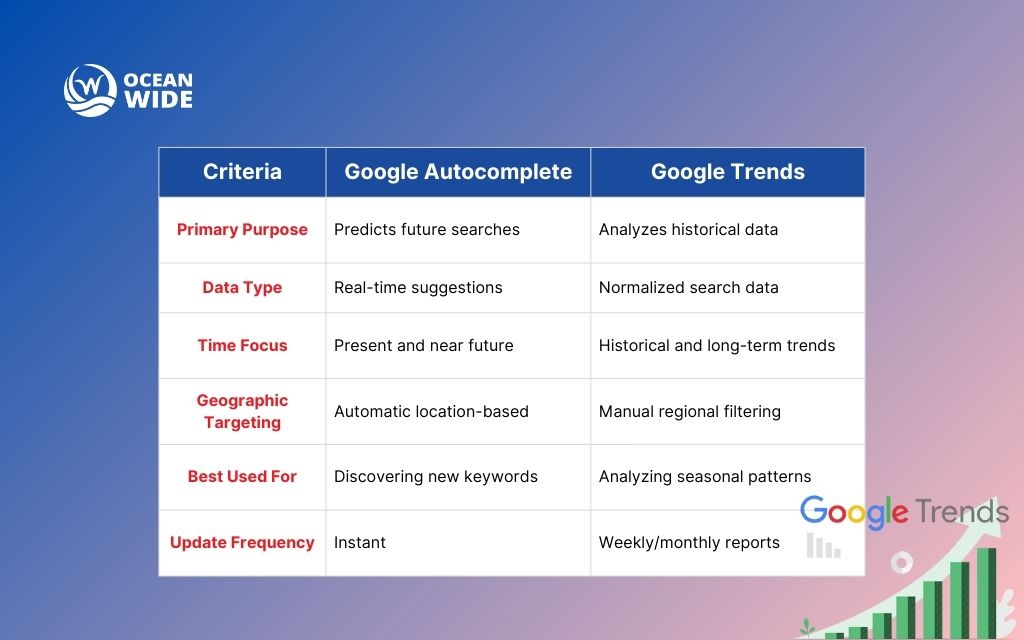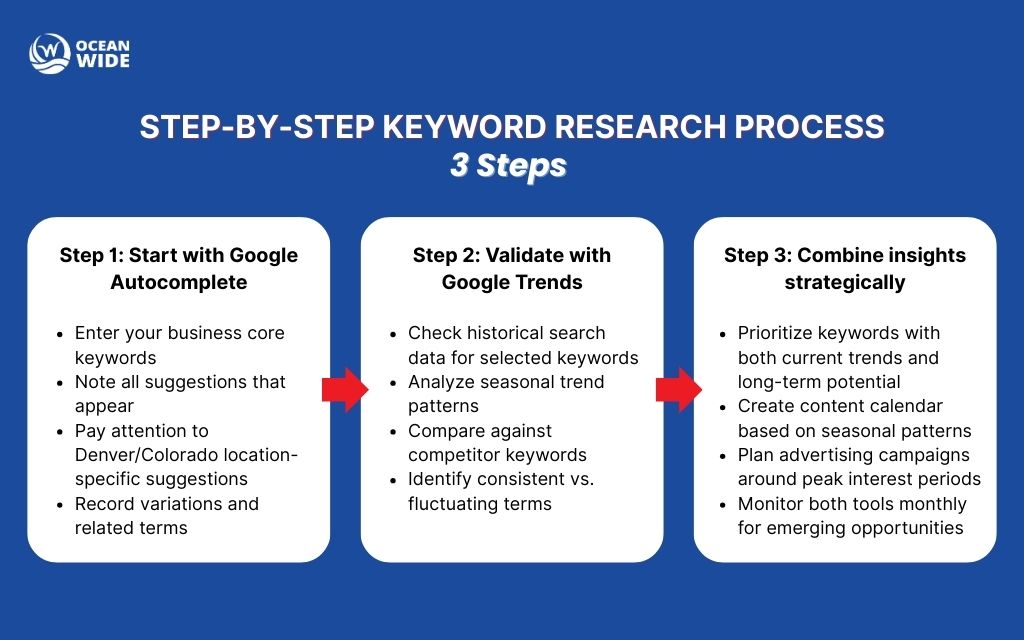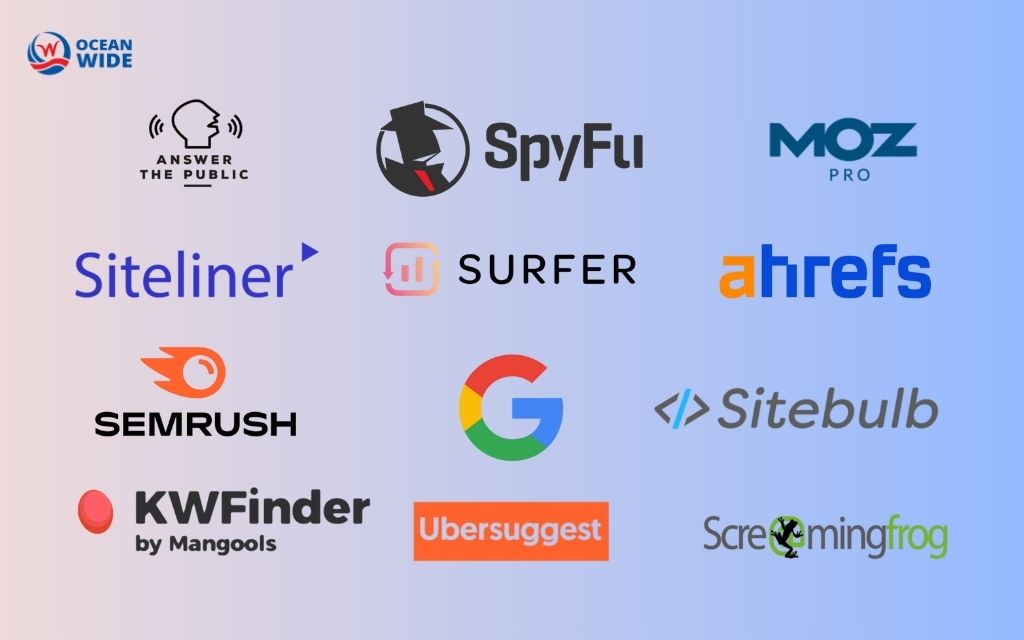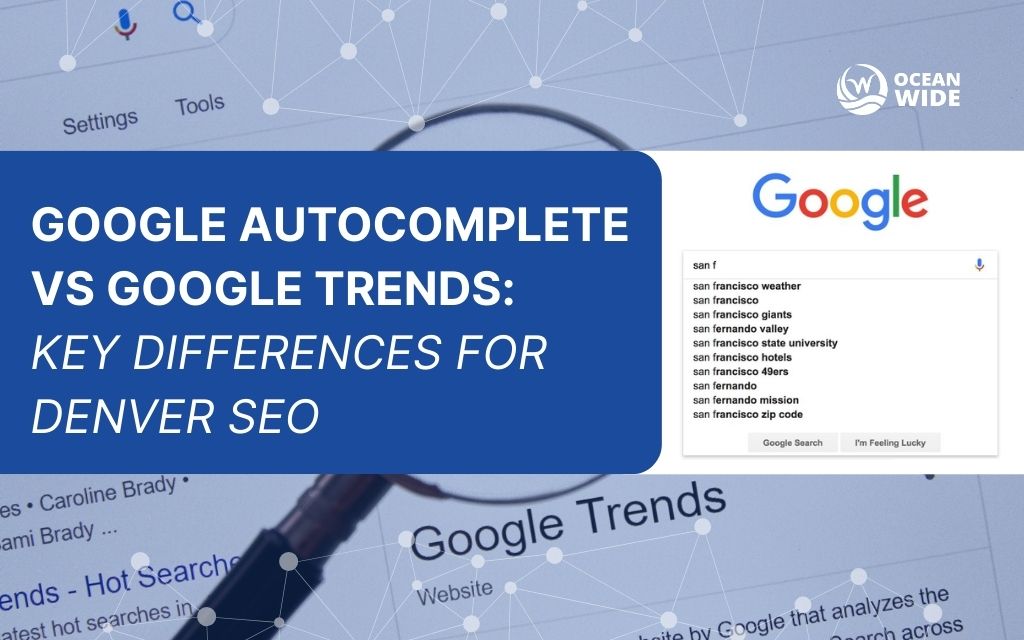Understanding the difference between Google autocomplete and Google Trends can transform your Denver business’s digital marketing approach. These two powerful Google tools serve distinct purposes in your SEO strategy, yet many Colorado businesses struggle to leverage their unique capabilities effectively.
Google’s search ecosystem offers these complementary tools that work together to enhance your keyword research methodology. While both provide valuable insights, they operate on fundamentally different principles that directly impact your local search optimization efforts in the Denver market.
What is Google Autocomplete and how does it work
Google Autocomplete represents the only search prediction system that combines real-time algorithmic filtering with personalization based on individual search history and geographic location. This predictive search technology generates query suggestions as users type, drawing from billions of search patterns to anticipate what Denver users might be searching for next.
The system uses machine learning algorithms to filter out policy-violating predictions while incorporating location-based data specific to Colorado markets. When someone starts typing “Denver restaurants,” Autocomplete instantly provides relevant suggestions like “Denver restaurants downtown” or “Denver restaurants with patios” based on current search trends in your area.
Search predictions from Autocomplete reflect real-time user behavior patterns, making them invaluable for understanding immediate search intent. For businesses focusing on local SEO keyword research Denver strategies, Autocomplete reveals what potential customers are actually typing into Google right now.
Understanding Google Trends and its data methodology
Google Trends operates as the only publicly available tool providing normalized search data on a 0-100 scale, processing billions of searches daily while using only a representative sample to maintain user privacy. This analytics platform reveals historical search data patterns that show how search interest changes over time.
The system filters out duplicate searches and low-volume queries while maintaining complete anonymization of user data. Unlike Autocomplete’s predictive nature, Google Trends shows actual search volume analysis from past queries, normalized to make comparisons meaningful across different topics and timeframes.
For Denver businesses, Google Trends helps identify seasonal patterns specific to Colorado markets. Search volume analysis through this tool reveals when customers are most likely to search for your services throughout the year.
Google autocomplete vs Google Trends differences explained

The fundamental difference between Google autocomplete and Google Trends lies in their core purpose and data sources. Autocomplete focuses on predicting what users might search for next, while Google Trends analyzes what users have already searched for historically.
Geographic targeting works differently in each tool. Autocomplete automatically adjusts suggestions based on your current location in Denver, while Google Trends allows you to manually filter data by specific regions, including Colorado-specific analysis.
Practical applications for Denver keyword research
| Tool | When to Use | Benefits for Denver Businesses |
| Autocomplete | Weekly keyword research | Captures immediate search trends |
| Google Trends | Quarterly content planning | Understands Colorado seasonal patterns |
| Combined Approach | Comprehensive SEO strategy | Balances short-term and long-term opportunities |
How to use Google autocomplete for keyword research starts with understanding your local Denver market dynamics. Begin typing core terms related to your business and observe what suggestions appear. These predictions reveal what Colorado customers are actively searching for right now.
Best SEO keyword research strategies for Denver businesses involve combining both tools strategically. Use Autocomplete to discover current search queries, then validate these findings against historical data in Google Trends to ensure sustained interest over time.
Google Trends seasonal keyword analysis Denver market patterns reveal crucial timing insights. Tourism-related searches peak during specific months, while business services show different seasonal variations that impact your content planning and advertising strategies.
Step-by-step keyword research process
Step 1: Start with Google Autocomplete
- Enter your business core keywords
- Note all suggestions that appear
- Pay attention to Denver/Colorado location-specific suggestions
- Record variations and related terms
Step 2: Validate with Google Trends
- Check historical search data for selected keywords
- Analyze seasonal trend patterns
- Compare against competitor keywords
- Identify consistent vs. fluctuating terms
Step 3: Combine insights strategically
- Prioritize keywords with both current trends and long-term potential
- Create content calendar based on seasonal patterns
- Plan advertising campaigns around peak interest periods
- Monitor both tools monthly for emerging opportunities

Advanced techniques for Colorado businesses
Entity recognition capabilities in both tools help Denver businesses optimize for semantic search patterns. Google Autocomplete suggests related entities and concepts, while Google Trends shows which related topics gain traction over time.
Contextual search suggestions from Autocomplete reveal user intent variations. Searching “Denver SEO” might suggest “Denver SEO company,” “Denver SEO services,” or “Denver SEO consultant,” each indicating different customer needs and purchase intentions.
Predictive search algorithms in Autocomplete incorporate breaking news and trending events. During major Denver events or Colorado news stories, suggestions adapt quickly to reflect increased search interest in related topics.
Common mistakes to avoid
❌ Avoid these mistakes:
- Relying on only one tool
- Ignoring Denver/Colorado geographic factors
- Missing seasonal business variations
- Misunderstanding Google Trends normalized data
✅ Instead, do this:
- Combine both tools in your research process
- Customize for local Colorado markets
- Plan content around seasonal business cycles
- Focus on relative trends, not absolute numbers
Over-relying on either tool individually limits your keyword research effectiveness. Autocomplete alone might lead you to chase temporary trends, while Google Trends alone might cause you to miss emerging opportunities.
Misinterpreting normalized data from Google Trends can lead to poor keyword selection decisions. Remember that the 0-100 scale shows relative interest, not absolute search volumes, making direct traffic predictions impossible without additional context.
Best SEO tools comparison Colorado businesses need
Google search tools for businesses offer complementary insights that enhance your overall SEO strategy. Autocomplete excels at discovering fresh keyword opportunities, while Google Trends validates long-term viability of your target terms.

User behavior patterns emerge more clearly when you analyze both tools together. Autocomplete reveals immediate interests, while Google Trends shows whether those interests represent temporary spikes or sustainable trends worth targeting.
Denver digital marketing professionals recognize that successful campaigns require both real-time awareness and historical perspective. Autocomplete keeps you current with immediate opportunities, while Google Trends prevents you from chasing short-lived trends.
FAQs about difference between Google autocomplete and Google Trends
Can Google Autocomplete replace Google Trends for SEO research?
No. Autocomplete = current predictions | Google Trends = historical analysis. Denver businesses need both for complete keyword strategies. The Ocean Wide combines both tools effectively for Colorado clients.
How accurate is location-based data for Denver businesses?
Both tools provide highly accurate location data for metropolitan areas like Denver. This accuracy makes them essential for local SEO keyword research Denver businesses depend on. Contact The Ocean Wide at (720) 334-0899 for local SEO expertise.
Why do Autocomplete suggestions differ from Google Trends results?
Autocomplete uses predictive algorithms | Google Trends shows actual historical data. They serve different research purposes. The Ocean Wide helps Denver businesses leverage both tools for maximum SEO impact.
How often should Colorado businesses update their keyword research?
Review Autocomplete monthly for emerging trends. Analyze Google Trends quarterly for seasonal patterns. Regular monitoring keeps your Denver business competitive. Let The Ocean Wide handle your ongoing keyword research strategy.
Do these tools help with local Denver SEO optimization?
Yes. Both provide crucial insights for Denver-specific targeting. Autocomplete reveals local patterns, Google Trends shows regional variations. Together, they create powerful local search optimization for Colorado businesses.
Partner with The Ocean Wide for expert Denver SEO services
Understanding Google autocomplete vs Google Trends differences represents just the beginning of effective SEO strategy for your Denver business. The Ocean Wide transforms this knowledge into actionable results through comprehensive digital marketing services tailored specifically for Colorado markets.
Our Denver-based team combines technical expertise with deep local market knowledge to create SEO strategies that deliver measurable results. We understand how seasonal patterns, local events, and regional preferences impact search behavior in the Colorado market.
From keyword research to content creation, web design to local SEO optimization, The Ocean Wide provides complete digital marketing solutions for Denver businesses ready to dominate their online presence. Our proven track record includes helping businesses across Colorado achieve sustainable growth through strategic SEO implementation.
Ready to transform your digital marketing approach? Contact The Ocean Wide today to discover how professional SEO services can elevate your Denver business above the competition.
The Ocean Wide Contact Information: Address: 1007 S Federal Blvd, Denver, CO 80219, United States Email: [email protected]
Phone: (720) 334-0899 – Available 24/7
Let The Ocean Wide guide your business through the complexities of modern SEO strategy. Together, we’ll create digital marketing campaigns that generate real results for your Denver business in the competitive Colorado marketplace.

